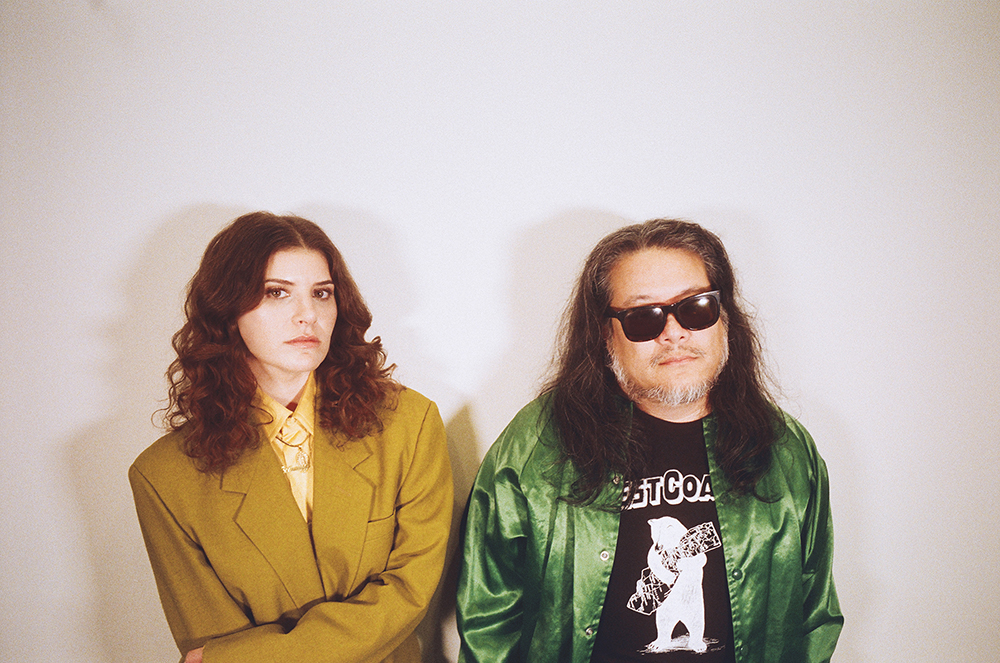Music
 Best Coast's Bethany Cosentino and Bobb Bruno. Photo by Kevin Hayes.
Best Coast's Bethany Cosentino and Bobb Bruno. Photo by Kevin Hayes.
Best Coast Comes of Age
March 8, 2020 @ 4:43pm
Nearly 10 years into her storied indie rock career, Best Coast singer, songwriter and guitarist Bethany Cosentino has finally found her stride. It’s not like she ever really lost it, though. But coming of age in the early aughts of the music blogosphere when critics’ evaluations of music like Cosentino’s – read, certifiable earworms of California rock goodness – was often unfriendly and presumptuous, it’s easy to see why it would take some time to fully come into your own creative voice.
She’s always been honest and confessional in her writing, but after returning to the recording studio with five years in-between the band’s efforts, Cosentino found herself sober, confident and ready to put out a true rock record that fully spoke her truth. Before Cosentino takes the stage in D.C. later this month with Best Coast’s other member Bobb Bruno, we spoke to her about the record, its inspirations and why she’s excited to get back on the road.
District Fray: It’s been five years between your last album and Always Tomorrow, your new record. It seems like you’ve been through a lot in terms of personal growth, your health and your sobriety. How did those experiences factor into the album lyrically?
Bethany Cosentino: I’ve always written from the place of what I know, what I’m experiencing and the life I’m living. This record is really a cumulative story of all of the experiences I’ve had since the beginning of my career. I feel like it’s the first piece of work I’ve really ever done that feels like it has a bit of resolution to it.
Where are you now versus with previous Best Coast albums?
All my past records have been me struggling with a lot of the same feelings and emotions, and living in this place where I’m like, “Yeah, f—k. I don’t know how to be. I don’t know how to deal with this.” This record has a lot more hope to it, where it’s like, “Okay, life is hard because that’s literally what life is. It’s hard!” But I’ve gotten to a place where I’m able to just accept it for what it is. I think it’s a relatable story. I don’t think you have to be a professional musician or even a sober person to understand the things that I’m talking about on this record. It’s just about learning to accept life for what it is.
You’re close to sisters Jennifer and Jessica Clavin of the band Bleached, who have also been on a similar journey of growth and sobriety. What has your experience been like surrounding yourself with people like them, and other musicians like yourself who seem to be ushering in a sea change in the music world?
I think we live in an era now where things are just coming at us in full force constantly. You can’t even keep up with the news because it’s just nonstop. I think a lot of people have these rock bottoms where they’ve realized like, “Oh God, I can’t keep doing things this way.” And then they crawl their way back to the top and whatever that journey looks like for that [person] is different. I do think it’s cool that a lot more [musicians] are talking about taking care of their mental health and sobriety and advocating for themselves, because this job is really hard and it requires you to give so much of yourself. It is very easy to forget to take care of yourself when you’re just all, “Go, go, go, go, go,” and not even just for musicians. With life in general, there’s so much content coming at us constantly that I think it becomes very easy to forget, “Oh yeah, I’m a human being. I have to take care of myself to survive.”
Your signature California rock sound is really present on your new album, but there are also some new evolutions and sounds. Can you tell me about who you were looking toward for inspiration while working on the new record?
We had a lot of references for this record that were super different than things we’ve had in the past. A lot of it was classic rock: Joan Jett and The Runaways, Thin Lizzy and Def Leppard. We talked a lot about The Cars. Fleetwood Mac is a constant influence for us, but I feel like we tapped into that in certain songs and in certain ways. We unintentionally made a rock record. We didn’t ever say, “Oh, we’re going to make a f—king rock record.” But it just had to happen. I think energetically, the story I’m telling in this record is an intense story, so some of these songs are [also] intense, heavy and different. I think it will grab people’s attention in a way in which previous records haven’t necessarily done.
What are you hoping that fans, both new and old, gain from or appreciate about Always Tomorrow?
I just hope that people can relate to it. I’m happy with it. I’m confident. I am proud of the things I’ve had to go through and the journey I’ve gone on. Your goal as an artist is to create something you’re proud of, and that people can listen to and relate to. I hope people walk away from hearing the songs [feeling] like the record affected [them]. Also, I’m finally in a place to be able to understand that it’s not for everyone, and that’s fine. I don’t base my worth on whether you like my record or not. I’ve made something that I’m very proud of, while telling a story I’m very proud of. At the end of the day, all I can do is be proud of what I’m putting out and just hope that other people can relate.
As far as getting back on the road, I hear touring can be very daunting. Are you looking forward to being on the road with this new mindset?
Yes, touring is very hard. It’s daunting. It is what it is. But having taken a big break from it, I think it’ll be really fun. And I think that with me being in a healthier place, I know now to [say], “This is my job.” When I get up onstage, I’m thinking, “That’s me, doing my job and performing,” and then when I get offstage, I can go back to just being me and doing my thing. I’m actually excited to go out [with] these new tools – these actual healthy coping mechanisms to come down from the actual show. I think it will be nice to do it and then go back to the bus and just get to be on my computer watching Netflix with my aromatherapy diffuser and be like, “Okay, cool.”
How do you feel about your back catalog now that you’ve created a more conclusive, cathartic record you could really put extra time and care into? Are there any songs you feel strongly about not playing or moving away from?
Because my music is so personal and I write lyrics that are so true to who I am and what I’ve been through, there’s certain stuff that when I sing it, I’m like, “Ugh, I don’t want to have to think about this.” But I remember that feeling, you know? A perfect example is the song “Boyfriend.” I can’t stand that song. I make a speech about it every time before we play it where I’m like, “This is my most hated Best Coast song.” But I have a love for it, because I see how excited people get when we play it and they act like it’s the first time they’ve ever heard it. The response is very sweet, so it allows me to step outside of it and think about how, as the person who wrote it, I’m very sick of it. But I see the way people react to it, and that makes me feel really happy.
Best Coast plays 9:30 Club on Thursday, March 19 with Mannequin Pussy. Tickets are $30, and doors open at 7 p.m. For more on the band and Always Tomorrow, visit www.bestcoast.net.
9:30 Club: 815 V St. NW, DC; 202-265-0930; www.930.com







